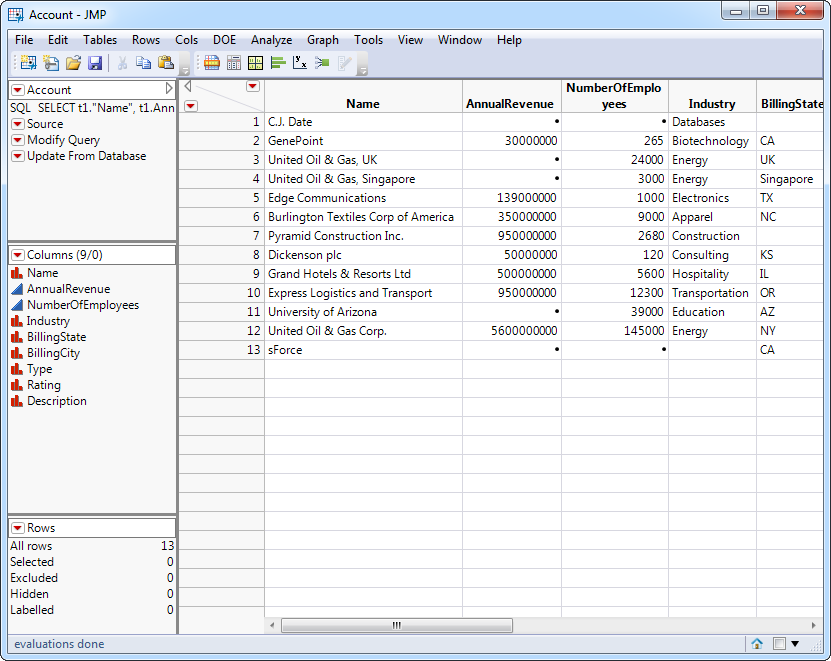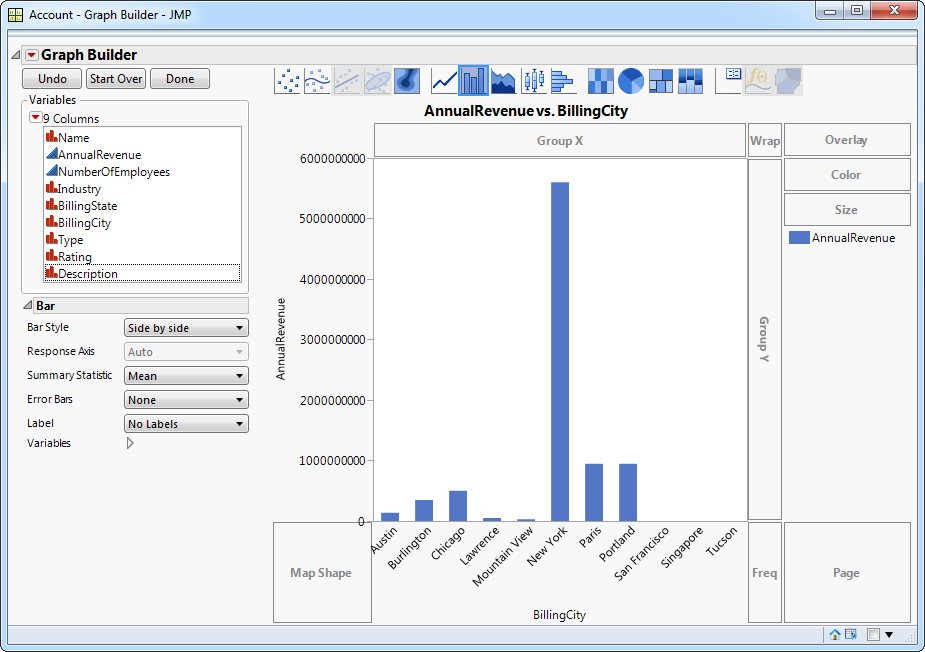Discover how a bimodal integration strategy can address the major data management challenges facing your organization today.
Get the Report →Use the CData ODBC Driver for SAP Ariba Source in SAS JMP
You can use the CData ODBC Driver to integrate SAP Ariba Source data into the statistical analysis tools available in SAS JMP. This article shows how to use SAP Ariba Source data in the Graph Builder and Query Builder.
You can use the CData ODBC Driver for SAP Ariba Source to integrate live data into your statistical analysis with SAS JMP. The driver proxies your queries directly to the SAP Ariba Source API, ensuring that your analysis reflects any changes to the data. The CData ODBC Driver supports the standard SQL used by JMP in the background as you design reports.
The SAP Ariba Source API supports bidirectional access. This article shows how to access SAP Ariba Source data into a report and create data visualization. It also shows how to use SQL to query and manipulate SAP Ariba Source data from the JMP Query Builder.
Access SAP Ariba Source Data as an ODBC Data Source
If you have not already, first specify connection properties in an ODBC DSN (data source name). This is the last step of the driver installation. You can use the Microsoft ODBC Data Source Administrator to create and configure ODBC DSNs.
In order to connect with SAP Ariba Source, set the following:
- API: Specify which API you would like the provider to retrieve SAP Ariba data from. Select the Supplier, Sourcing Project Management, or Contract API based on your business role (possible values are SupplierDataAPIWithPaginationV4, SourcingProjectManagementAPIV2, or ContractAPIV1).
- DataCenter: The data center where your account's data is hosted.
- Realm: The name of the site you want to access.
- Environment: Indicate whether you are connecting to a test or production environment (possible values are TEST or PRODUCTION).
If you are connecting to the Supplier Data API or the Contract API, additionally set the following:
- User: Id of the user on whose behalf API calls are invoked.
- PasswordAdapter: The password associated with the authenticating User.
If you're connecting to the Supplier API, set ProjectId to the Id of the sourcing project you want to retrieve data from.
Authenticating with OAuth
After setting connection properties, you need to configure OAuth connectivity to authenticate.
- Set AuthScheme to OAuthClient.
- Register an application with the service to obtain the APIKey, OAuthClientId and OAuthClientSecret.
For more information on creating an OAuth application, refer to the Help documentation.
Automatic OAuth
After setting the following, you are ready to connect:
-
APIKey: The Application key in your app settings.
OAuthClientId: The OAuth Client Id in your app settings.
OAuthClientSecret: The OAuth Secret in your app settings.
When you connect, the provider automatically completes the OAuth process:
- The provider obtains an access token from SAP Ariba and uses it to request data.
- The provider refreshes the access token automatically when it expires.
- The OAuth values are saved in memory relative to the location specified in OAuthSettingsLocation.
When you configure the DSN, you may also want to set the Max Rows connection property. This will limit the number of rows returned, which is especially helpful for improving performance when designing reports and visualizations.
Import SAP Ariba Source Data with the Query Builder
After you have created the SAP Ariba Source DSN, you can use SQL to invoke the capabilities of the SAP Ariba Source API. Follow the steps below to execute some supported queries in the Query Builder:
- In SAS JMP, click File -> Database -> Query Builder. The Select Database Connection dialog is displayed.
- Click New Connection.
- On the Machine Data Source tab, select the DSN. In the next step, the Select Tables for Query dialog is displayed.
- In the Available Tables section, select a table and click Primary.
- As you drag Available Columns to the Included Columns tab, the underlying SQL query is updated.
![The generated query in the Query Builder. (Salesforce is shown.)]()
- Click Run Query to display the data.
![The results of a query in the Query Builder. (Salesforce is shown.)]()
- To refresh the results with the current data, right-click Update from Database and click Run Script.
Manipulate SAP Ariba Source Data
You can execute data manipulation queries from JSL scripts such as the one below. To execute a script, click New Script in the toolbar. To connect, specify the DSN. You can then use the standard SQL syntax:
Open Database( "DSN=CData SAPAribaSource Source;",
"INSERT INTO Vendors
(Region)
VALUES ('USA');");
Visualize SAP Ariba Source Data
After importing, you can use the Graph Builder to create graphs visually. To open the Graph Builder, click the Graph Builder button in the toolbar.
- Drag a dimension column onto the x axis. For example, SMVendorID.
- Drag a measure column onto the y axis. For example, Category.
- Select a chart type. For example, a bar chart.
![Configuration of a basic chart. (Salesforce is shown.)]()









